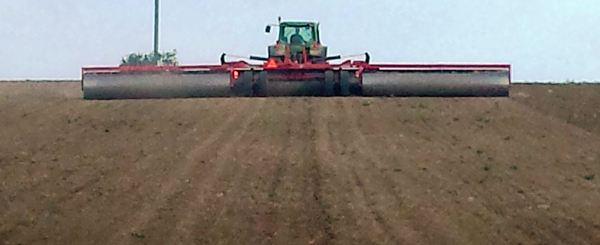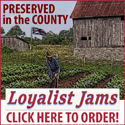Policy dangerous and short-sighted; food at risk if prime ag used for housing: farmers
Administrator | May 24, 2023 | Comments 4
By Sharon Harrison
“To farm, we need farmland!” proclaimed John Thompson, president of the Prince Edward Federation of Agriculture. “We do not support policies that will increase residential lot creation in prime agricultural areas, or in rural areas that are actively farmed.”
In his deputation to council Tuesday evening, Thompson, speaking on behalf of a united front and coordinated effort of 13 Ontario agricultural organizations, stated the collective ask is for the Ontario government to press pause on the recently proposed Provincial Policy Statement, as well as the newly proposed Bill 97 (Helping Homebuyers, Protecting Tenants Act, 2023).
“A joint statement like this is unprecedented, likely because this is the most dangerous and short-sighted policy that a government has ever brought forward,” said Thompson. “I would be really astonished if the Minister of Agriculture and the MPP don’t understand this.”
Organizations signed onto this joint statement include the Ontario Federation of Agriculture, Beef Farmers of Ontario, Ontario Farmland Trust, Ontario Sheep Farmers, Dairy Farmers of Ontario, Egg Farmers of Ontario, National Farmers Union- Ontario, Chicken Farmers of Ontario, Ontario Pork, Veal Farmers of Ontario, Ontario Broiler Hatching and Egg and Chick Commission, Golden Horseshoe Food and Farming Alliance.
The proposed policies intended by the provincial government would allow three-lot residential severances per farm parcel in prime agricultural areas, as well as other measures that Thompson says will “weaken local farmland protection”, something he says they are in strong opposition to.
“Collectively, we seek your commitment to preserving Ontario’s farmland and specialty croplands across the province,” Thompson said. “ We request that the limited circumstances permitting residential lot creation in prime agricultural areas under the 2020 Provincial Policy Statement be retained in the new proposed Provincial Planning Statement.”
Councillor John Hirsch’s request to add to the motion carried unanimously, and reads as follows:
“And that council support the Prince Edward Federation of Agriculture’s request to the provincial government to develop a way forward to support and create a framework for needed housing and development while ensuring the long-term success and viability of the agricultural sector, and that this expression of support be included in the mayor’s letter to the provincial government included in item 10.7 on this agenda.”
Item 10.7 on the agenda refers to the report of the special Agriculture Advisory Committee meeting held on May 1, which states:
“That the Agricultural Advisory Committee requests that the mayor write a letter on behalf of the municipality to ask that the proposed Provincial Planning Statement is changed to reflect the issues affecting the agricultural community of Prince Edward County, such as the permission of severance’s on prime agricultural land, the removal of the consideration of prime agricultural land, and the lack of need for such changes when 1.25 million residential units are approved currently awaiting construction as reflected in the public comments and the committee discussion.”
At the May 9 meeting of council, Hirsch put forward a resolution on the proposed new Provincial Policy Statement, where he also requested a copy of be sent to all 444 municipalities, the premier of Ontario, the Minister of Municipal Affairs and Housing, the Ministry of Agriculture, Food and Rural Affairs, the Minister of Environment, Conservation and Parks, MPP Todd Smith, the Association of Municipalities of Ontario, the Federation of Canadian Municipalities, and the Eastern Ontario Wardens Caucus.
Ontario’s productive farmland is a scarce resource, making up less than five per cent of all the land in the province.
“It is our unwavering position that agricultural production is the most valued and best use of this land and we believe in the importance of a healthy, viable and sustainable supply of food products grown, harvested and processed right here at home,” said Thompson. “We are confident that long-term food system security for the people of Ontario, Canada and the world is a shared priority with the general public and our governments.”
A member of the public, Don Wilford, spoke in favour of Thompson’s comment, noting how Ontario has a finite construction capacity, and that “this policy is really going to be detrimental to anything we can do for affordable housing”.
“We can’t just dial-up that construction sector will double the amount of houses, or anything else that it can build, it’s got a finite capacity,” said Wilford. “If we ask it to do more than it can do, all we’ll do is elevate the cost of construction, and I think there’s lots of evidence that’s already happening, and we know it’s already hard to find trades in construction.”
He said the more the construction industry is asked to do, the harder it’s going to get.
“If we open up rural land to three times as many lots, we will find it very difficult to build affordable housing,” added Wilford. “If we were going to have a coherent affordable housing strategy, we would be trying somehow to direct that construction capacity to affordable housing and not to big houses on rural land in places like Prince Edward County.”
The implications of Bill 97 and the proposed Provincial Planning Statement for Ontario agriculture are significant and concerning for the agriculture and agri-food sector, said Thompson.
“These decisions will have long-term, intergenerational implications for Ontario farmers, food security, water resources and the agri-food economy.”
He explained how residential lot creation in agricultural areas has long been controversial and the detrimental impacts for agriculture are well demonstrated, including fragmentation of the agricultural land base, increased conflicts between neighbouring land uses, risk of inflating farmland prices and increasing costs to municipalities.
“In addition, we have significant concerns regarding the speculative investment that this proposal will drive, resulting in farmland values that make farming even more unattainable for the next generation,” stressed Thompson. “Any policies that might open land for speculative purchase and investment need to be discouraged.“
Councillor David Harrison said he was in favour of prime land providing it is prime, where his main point was about two statistics presented in the motion.
“We have lost 23.6 per cent of our agricultural land in the past 20 years, and we’ve lost of over 7,000 acres over the last decade,” noted Harrison. “How are these statistics arrived at because to me they don’t seem quite right?”
Thompson indicated Statistics Canada produces the numbers and “we have to go by those”.
Councillor Bill Roberts noted the long list of some of the issues that are involved, such as limited expansion of livestock operations, farm equipment access, home owner complaints, fragmentation and permanent removal of farmland, and multiplying the number of entrances to properties by up to 10 times to create access for housing sub-divisions.
He asked if there were any other issues, especially if they are Prince Edward County specific, to bring to the public’s attention and Thompson highlighted the safety of wells and septic systems.
“They need land space, and you know in the County a lot of the wells are really challenged, so that could be a concern everywhere, but more in the County where some of the land is shallow,” Thompson said.
“The gist I’m getting is the Prince Edward Federation of Agriculture and the substantive list of other agricultural organizations are pretty adamant that Bill 97 imperils the future of agriculture in Ontario, and that the future of agriculture in this province is at stake,” noted Roberts.
As farm leaders and organizations, Thompson said they have worked diligently to manage and mitigate conflict between farming and non-farming neighbours in all types of agriculture.
“The proposed changes will exacerbate conflict between farming and non-farming neighbours for all aspects of farming including application of crop nutrition and crop protection products, wildlife control and more.”
Thompson said they support minimum distance separation and see it as a valuable tool to minimize conflicts between farm operations and residential areas with respect to livestock operations. Additional lot severances proposed will make it difficult or impossible for farmers to operate, expand and grow their farms, he said.
“Ontario boasts some of Canada’s richest and most fertile farmland and these policy changes put the sustainability of that land, and the food system it provides, at great risk.”
He said directing growth to settlement areas, urban and rural is better for both agriculture and municipalities.
“Housing needs can be met in serviced settlement areas on a much smaller land base which reduces farmland loss and potential land use conflicts while encouraging on-going investment in farm and farm-related businesses,” outlined Thompson.
He said it also ensures efficient use of municipal infrastructure investments and reduces costs to provide services.
“Responsible land-use planning is critical to balancing the needs of our growing communities and to ensure that our agriculture and agri-food sector survives and thrives.“
In his presentation Thompson noted how Ontario’s agri-food sector is an economic powerhouse, fuelling rural communities, generating nearly 750,000 jobs and contributing more than $47 billion to Ontario’s annual gross domestic product.
In its second reading at Queen’s Park, Bill 97 is an act intended to amend various statutes with respect to housing and development. The consultation period for the proposed Provincial Policy Statement closes on June 5.
Thompson would like the public to inform themselves on the topic as much as possible where he suggests checking out the Ontario Farmland Trust and Federation of Agriculture websites, among others.
“Read up on this and the public can put in their concerns to their MPP, minister of housing, premier’s office, and environmental registry,” said Thompson. “I think everyone should speak up as numbers should count.”
Filed Under: Featured Articles • Local News
About the Author:

































I think Mr. Thompson made it clear..there are other concerns when housing lots are too close to the farm operation. Diesel tractors running after dark, irrigation , dust, spray and manure smells, anytime up to 18 hrs. a day. When the rush is on the farmer will work around the clock. Even the retired farmer who sells off his severed lots may have trouble leasing the balance of the acreage to another farmer because of close proximity to new housing.
Rural living will help the housing crisis. It is far more affordable and actually makes farms more sustainable. There is minimal loss of land. It allows rural land owners to keep their children on the farm,
Problem being that Prime Ag areas are too large and inconsistent. Many areas designated as Prime Ad include marginal farmland. The system needs an overhaul to better distinguish soil types.
Rural severances are positive for landowners children to have a place to reside. Not all can afford or desire urban living.